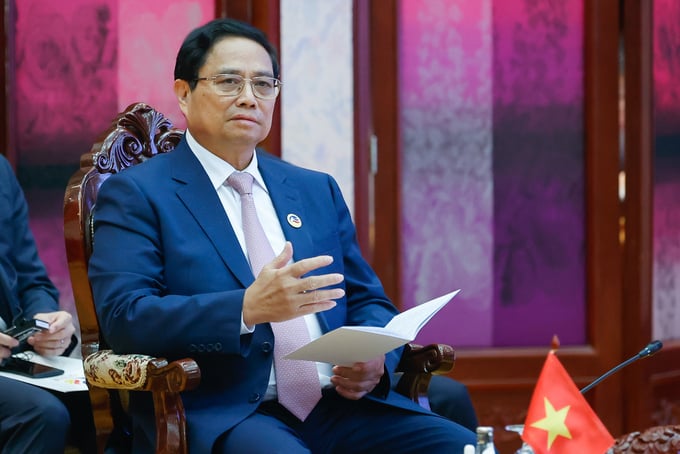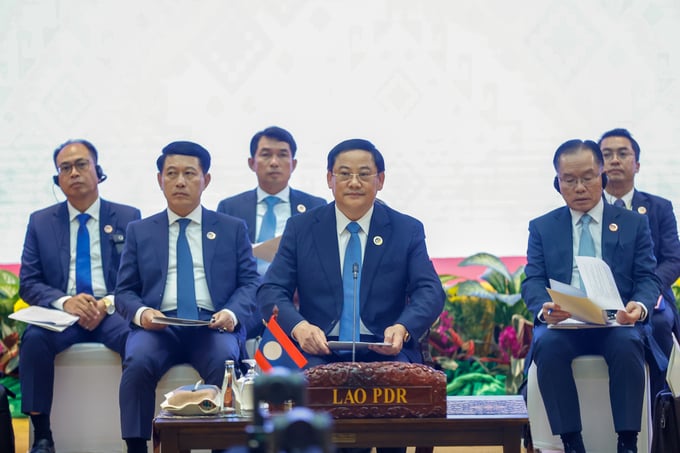November 26, 2025 | 00:46 GMT +7
November 26, 2025 | 00:46 GMT +7
Hotline: 0913.378.918
November 26, 2025 | 00:46 GMT +7
Hotline: 0913.378.918

Prime Minister Pham Minh Chinh emphasized that ASEAN must maintain a proactive position in seizing and utilizing growth opportunities. Photo: VGP.
During the ongoing agenda of the 44th and 45th ASEAN Summits and related meetings in Vientiane, Laos, on October 9, member states assessed the extensive shifts in the international and regional security environment, which have presented ASEAN with a mix of opportunities and challenges. Geopolitical tensions, conflicts, and instability have emerged in various regions, exacerbated by persistent economic risks and escalating issues such as climate change, natural disasters, and cybersecurity threats. However, new growth drivers also offer new potential and development opportunities for ASEAN, as well as for cooperation between ASEAN and its partners.
In response to these volatile developments, ASEAN leaders highlighted the strategic significance of promoting connectivity and resilience, sharing the importance of maintaining solidarity, unity, and the bloc's central role. Furthermore, its member states must enhance ASEAN's capacity to confidently seize opportunities and strengthen resilience against challenges.
Regarding international and regional issues of mutual concern, member states have agreed to reinforce ASEAN's principled stance on the East Sea. The parties have emphasized the importance of complying with international law and the peaceful resolution of disputes in accordance with international law and the 1982 United Nations Convention on the Law of the Sea (UNCLOS). The ASEAN leaders also praised the efforts of the Lao Presidency and the Special Envoy to Myanmar in resolving disputes on the international stage, highlighting the "Five-Point Consensus" as a guiding document for ASEAN's efforts to support Myanmar.
In his remarks during the closed meeting, Prime Minister Pham Minh Chinh shared his observations and assessments of the current global situation. Prime Minister Chinh added that, despite the current peaceful state of global politics, localized conflicts and wars continue to affect all countries around the world. These ongoing challenges disrupt supply chains and production processes, leading to increased costs of raw materials, energy, and transportation.

The Prime Minister of Laos attended and gave a presentation at the closed session of the 44th and 45th ASEAN Summits. Photo: VGP.
The Prime Minister called for ASEAN to unite and amplify its collective voice in advocating for an end to wars and conflicts; while seeking solutions that promote peace based on respect for international law. He emphasized that ASEAN must maintain a proactive position in seizing and utilizing growth opportunities, fostering digital transformation, advancing green development, addressing climate change, and exploring emerging areas of potential cooperation.
Regarding international conflicts on the East Sea, Prime Minister Pham Minh Chinh stressed that disputes over maritime sovereignty must be resolved through peaceful means in accordance with international law, particularly the 1982 United Nations Convention on the Law of the Sea. He urged all parties to respect the interests and sovereign rights of the countries involved. Additionally, he highlighted the importance of ensuring security, safety, and freedom of navigation and overflight in the East Sea, which is a vital transportation route for 60% of global trade volume. This route has the potential to affect all countries, especially those in the region. Accordingly, he called on ASEAN member states to unite, reinforce their central role, and maintain a common stance on the East Sea.
Prime Minister Pham Minh Chinh also commended the 2024 Lao Presidency and previous rotating chairs for assisting Myanmar in seeking solutions based on the "Five-Point Consensus." However, he noted that the effectiveness of these efforts has remained limited to date, indicating the need for a new approach from ASEAN.
Expressing support for various solutions proposed by other ASEAN member states, the Prime Minister affirmed that any resolution for Myanmar must be approved by the people of Myanmar. He encouraged all relevant parties within Myanmar to engage in dialogue and negotiation to end the conflict, with the aim of preventing adverse effects on the population or severe security repercussions in the region, including transnational crime and online fraud.
Accordingly, Prime Minister Chinh urged all stakeholders in Myanmar to collaboratively seek solutions. He advocated for ASEAN to play a pivotal role as a facilitator for dialogue and negotiations among the parties involved. Moreover, ASEAN must strengthen unity, solidarity, and its central role in these efforts. These values have contributed to ASEAN's success and reputation, enabling it to overcome challenges and become a focal point for peace and cooperation.
Translated by Nguyen Hai Long
/2025/11/24/3536-2-112800_176.jpg)
(VAN) Dong Nai now has tens of thousands of hectares of forests certified for sustainable management, and this area will continue to be expanded in the coming period.

(VAN) Vinh Ha hamlet (Dai Xuyen commune, Hanoi) is shifting away from small-scale farming as households adopt bioscurity into their breeder chicken models.

(VAN) Heavy rains make aquatic species more vulnerable to disease. Proactive water management and high-tech systems help farmers prevent outbreaks and protect yields.

(VAN) Greenhouses are shifting production mindsets in Binh Lu commune, enabling farmers to ‘weather the sun and rain’ and secure stable vegetable harvests throughout the year.

(VAN) Green transition is crucial for the Mekong Delta amid climate change and stricter standards, offering a path toward sustainability.

(VAN) Dong Thap promotes agricultural restructuring, forms large specialized farming zones, raises the value of agricultural products and develops toward ecological and high-tech directions.
/2025/11/22/4018-4-213342_747.jpg)
(VAN) The Mekong Delta Agricultural Experts Club has attracted 143 experts and researchers to participate in providing consultancy and contributing initiatives to the development of one million hectares of high-quality rice.